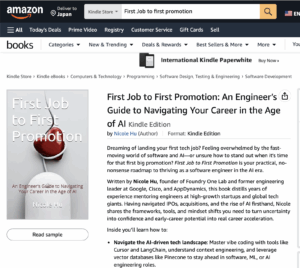When you start a new job, one of the most important steps you can take—often overlooked by engineers—is to intentionally build relationships with the people around you. Your success in the workplace isn’t just about writing great code; it also depends on how well you understand the team dynamics, communicate with your peers, and learn from those ahead of you.
Here’s a breakdown of key people you’ll interact with—and how to build strong working relationships with them:
1. Your Manager
Your manager plays the most critical role in your early career success. They are responsible for setting your goals, tracking your performance, providing feedback, and ultimately influencing your career trajectory within the company.
What to focus on:
- Schedule regular 1:1s and come prepared with questions or updates.
- Ask for clarity on priorities, expectations, and how success is measured.
- Understand how your work contributes to team and company goals.
- Be open about areas where you want to grow—they can help align opportunities accordingly.
Your manager is not just your boss—they’re also your advocate. Build trust by being dependable, communicative, and receptive to feedback.
2. Technical Lead (Tech Lead)
The Tech Lead is your guide for all things technical. They oversee the implementation quality, help prioritize engineering efforts, and often lead projects and review your code.
What to focus on:
- Learn their coding standards, architectural decisions, and workflows.
- Don’t hesitate to ask technical questions—it’s better to clarify than to guess.
- Show initiative by asking for resources or opportunities to work on meaningful projects.
- Observe how they problem-solve and make trade-offs—that’s where real learning happens.
Building a strong rapport with your Tech Lead will fast-track your technical development and help you understand what “great engineering” looks like in your team.
3. Mentor
Your mentor is someone (often outside your immediate reporting line) who supports your professional development and helps you grow your career over the long term.
What to focus on:
- Use your mentor to talk through challenges, decisions, and career aspirations.
- Ask them how they navigated similar situations when they were starting out.
- Treat mentorship as a two-way street—share your wins, lessons learned, and areas where you want guidance.
- Be proactive in scheduling conversations; your mentor likely has a full plate.
A great mentor can help you think beyond the next sprint—they’ll help you plan for the next step in your journey.
4. Buddy
Your buddy is usually a peer assigned to help you get onboarded quickly and comfortably. They’re your informal go-to for daily questions and company culture.
What to focus on:
- Ask about unspoken team norms, tooling shortcuts, or who to talk to for specific tasks.
- Check in regularly to reduce isolation and build social rapport.
- Use their perspective to get a peer-level understanding of expectations and team dynamics.
Your buddy can help you avoid rookie mistakes and speed up your onboarding through day-to-day practical support.
Final Tip: Be Curious and Proactive
Don’t wait for people to reach out to you—initiate connections. Introduce yourself in meetings, send a quick message to say hello, or ask if someone has time for a coffee chat. Learning who’s who—and how to work effectively with each person—will give you a strong foundation not just for surviving your first few months, but for thriving long-term.
My book First Job to First Promotion covers this topic in depth, with practical tips and real-world insights to help you build strong connections at work. Visit 0to1advisor.com to learn more.




